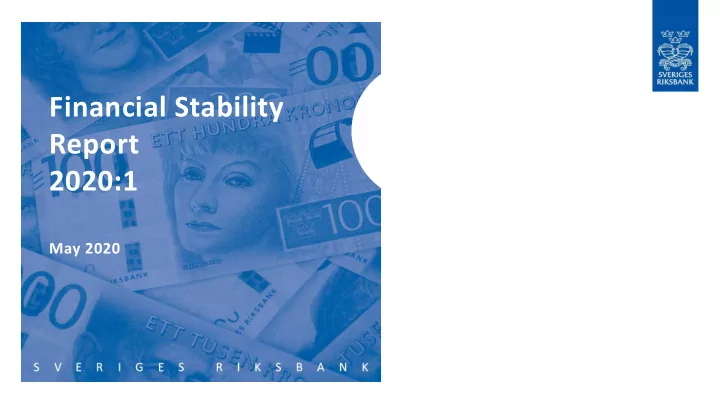

Financial Stability Report 2020:1 May 2020
The coronavirus pandemic is increasing the risks to financial stability
Substantial movements on global financial markets Stock market movements in domestic currency Interest rates on interbank loans Per cent Index, 2 Jan 2019 = 100. Sources: Bloomberg, Macrobond and the Riksbank
Increased uncertainty on financial markets in Sweden Yield difference between bonds and government bonds in Sweden • Shortage of US dollars has affected Swedish banks, National Pension Funds and insurance firms • More difficult and more expensive for banks and companies to obtain funding • Powerful measures have been implemented Per cent. All bonds are zero coupon rates calculated using the Nelson-Siegel method. Corporate bonds for companies with credit ratings of BBB or higher. Sources: Macrobond, Refinitiv and the Riksbank
Substantial effects on the Swedish economy Large fall in Swedish GDP this year • Companies have been hard hit and bankruptcies are expected to increase • Unemployment is expected to rise sharply • Major uncertainty regarding how deep and prolonged the economic decline will be Index 2019 Q4 = 100 Sources: Statistics Sweden and the Riksbank
Companies have considerable need for financial support and loans Several companies state that it is considerably more difficult to fund operations • Greater pressure on banks to provide loans • Companies say that it has become more difficult to obtain bank loans • Risk of increasing lending rates The chart shows the share of companies saying it is considerably more difficult than normal to fund operations. Source: National Institute of Economic Research
Extensive measures to hold down interest rates and facilitate credit supply The banks can borrow from Purchases of government, Increased access Loans in the Riksbank for onward lending mortgage, municipal bonds and to safe and liquid assets US to companies commercial paper dollars 500 billion 300 billion Unlimited USD 60 billion Utilised: Utilised: Utilised: Utilised: 158 billion 102 billion 26 billion 2 billion
Measures planned so far in 2020 Week: 22 24 26 28 30 32 34 36 38 40 42 44 46 48 50 52 Loans Companies via banks SEK, 3 months. USD Asset purchases Government bonds Covered bonds Commercial paper Municipal bonds Planned market operations
Banks’ credit losses may increase if the crisis is deep and prolonged • More bankruptcies lead to increased credit losses • Two scenarios from the Monetary Policy Report in April • If the crisis is prolonged, banks may have problems with credit supply. • The housing market considerable bearing on the effects Percentage of lending to the public. Handelsbanken, Nordea, SEB and Swedbank are included in the stress test. Sources: Banks' annual reports and the Riksbank
Good conditions but more may be needed The Swedish financial system is functioning satisfactorily for the time being – thanks to the measures introduced. • Finansinspektionen has taken measures • Banks have buffers that can be used • The Riksbank has given banks good prerequisites More extensive measures may be needed
The coronavirus pandemic is highlighting the importance of good resilience • Established regulatory frameworks shall be retained • Continued efforts to reduce vulnerabilities and increase resilience in the financial system. • Banks recreate capital and liquidity buffers if these have been used • Manage the fundamental problems on the housing market and reduce the risks of high household indebtedness
Interesting articles in the report • The Riksbank’s measures during the coronavirus pandemic • The Riksbank’s stress test of banks’ capital – an update • The interconnectedness of insurance companies, National Pension Insurance Funds and banks via the foreign exchange market • A new reference rate – the way forward
The coronavirus pandemic is increasing the risks to financial stability
Recommend
More recommend